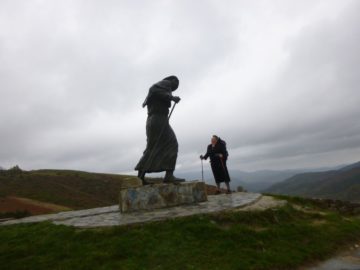To help us in this Ordinary Time, we offer a Franciscan Gospel reflection and questions written by Fr. Paul Gallagher, OFM for your prayer. They are edited by Franciscan Sister of Christian Charity Sister Anne Marie Lom and Joe Thiel. The excerpts from the Sunday readings are prepared by Joe Thiel. To read or download the complete pdf with excerpts for your prayer, please click here: Franciscan Gospel Reflection June 30 2019. Excerpts are from the Lectionary for Mass for Use in the Dioceses of the United States of America, second typical edition © 2001, 1998, 1997, 1986, 1970 Confraternity of Christian Doctrine, Inc., Washington, DC. Used with permission. All rights reserved. No portion of this text may be reproduced by any means without permission in writing from the copyright owner. Please include this information when printing.
Luke 9:51-62
When the days for his being taken up were fulfilled, he resolutely determined to journey to Jerusalem, and he sent messengers ahead of him.
On the way they entered a Samaritan village to prepare for his reception there, but they would not welcome him because the destination of his journey was Jerusalem. When the disciples James and John saw this they asked, “Lord, do you want us to call down fire from heaven to consume them?” Jesus rebuked them, and they journeyed to another village.
As they were proceeding on their journey someone said to him, “I will follow you wherever you go.” Jesus answered him, “Foxes have dens and birds of the sky have nets, but the Son of Man has nowhere to rest his head.”
And to another he said, “Follow me.” But he replied, “Lord, let me go first and bury my father.” But he answered him, “let the dead bury their dead. But you, go and proclaim the kingdom of God.”
And another said, “I will follow you, Lord, but first let me say farewell to my family at home.” To him Jesus said, “No one who sets a hand to the plow and looks to what was left behind is fit for the kingdom of God.”
Background:
On the last three Sundays, the Church has celebrated the feasts of Pentecost, the Holy Trinity, and the Body and Blood of Christ. Starting this Sunday and running through to the feast of Christ the King in late November, the Church now returns to the Sundays of Ordinary time. The gospel readings will have the general pattern of following one upon the other through Luke’s gospel. The background material will note how one gospel text follows on the previous, and it will also cover the verses that are skipped between the two Sundays. Hopefully this will help the reader have a sense of the flow of the Gospel texts, and provide richer appreciation of the text for each Sunday.
Preceding this Sunday’s gospel, Jesus has been praying alone, and at some point he turns to the disciples and asks them, “Who do the crowds say that I am?” (Luke 9:18) Peter replies that he believes Jesus to be the “Christ of God.” Jesus then begins to reveal to them what that really means, telling them he will be rejected by the leaders, be killed, and then rise on the third day. As the disciples have been privileged with this information, they are also told not to tell others.
Luke then recounts Jesus’ instruction to the disciples about the kind of commitment they must be willing to make as disciples. Luke then records his description of the Transfiguration. After that, coming down the mountain, Jesus encounters a man whose son is possessed by a demon. Jesus heals the boy. While the disciples are still amazed by what has happened, Jesus predicts a second time that he will be handed over, and he talks again about the nature of being his disciple.
In these verses Luke is describing how Jesus is unfolding his relationship with the disciples, and the true nature of his mission. Even as they are given a privileged understanding of who Jesus is, he is also making it clear what is expected. Jesus will continue to unfold his relationship with the disciples through the next ten chapters of Luke’s gospel, at which point he enters Jerusalem in Chapter 19. The first verse of this week’s gospel makes it clear that Jesus is moving toward Jerusalem. This is as much a spiritual journey as geographical. The disciples, Jesus’ inner circle, are being invited to join him.
Key to appreciating the gospel text for this Sunday is understanding the animosity between the Jews and the Samaritans that at this point had a 700-year history. About 721 BC the Assyrians defeated the northern kingdom, Israel. Many people were deported, and aliens resettled the Jewish land. Many of the Jews who remained intermarried with these aliens. When the Jews returned from captivity 200 years later, they were angry about those who were able to remain in their homeland, who were not faithful to their Jewish traditions and who had also intermarried with their new alien neighbors. The animosity was so great that these people were not permitted to even help in the rebuilding of the temple. In time the Samaritans built their own temple to Yahweh on Mount Gerizim. Hostility and disagreement about proper worship of Yahweh interlaces the relationship between Judeans and Samaritans. During Passover about the year 6 A.D., some Samaritans desecrated the temple in Jerusalem by throwing bones throughout the temple. About 45 years later the Samaritans of the village of Gema murdered a pilgrim on the way to Jerusalem for Passover. Some Judeans responded by burning the village to the ground and killings its inhabitants.
In Matthew, Jesus tells his disciples not to even enter the Samaritan towns (Matt 10:5). Luke’s gospel expresses a different attitude toward Samaritans. In the text for today, Jesus rebukes the two disciples who would destroy this Samaritan town. Luke’s gospel contains the parable of the “Good Samaritan.” The Samaritan leper who returns to thank Jesus for being cured is not instructed to make the customary offering in the Temple of Jerusalem. It would seem as if Luke has intentionally moved toward a more reconciling presentation of Jesus’ attitude toward the Samaritans.
In the last six verses of today’s gospel, it may seem like Jesus is discouraging those who would become his disciples. In verses 57 and 58 his comments seem to discourage one who may want to join him. In the remaining verses Jesus invites two men to become followers but seems to have no patience for their need to fulfill social obligations to family. The admonitions are given to nameless would-be followers. Therefore, they are understood to be part of Jesus’ instruction on the kind of commitment that is expected of his disciples. By including these admonitions here, Luke is inviting the members of his community reflect on their own commitment as disciples.
Reflection Questions:
1. The conflict between the Jews and the Samaritans brings to mind…
2. The willingness of James and John to call down fire from heaven seems to me…
3. If you were the person who approached Jesus and said, “I will follow you wherever you go,” how would you understand Jesus’ response?
4. In this gospel two people told Jesus they would become his follower, but first… As you hear this “but first,” what thoughts and feeling some to mind? Can you take some time now to talk with God about those thoughts or feelings?




